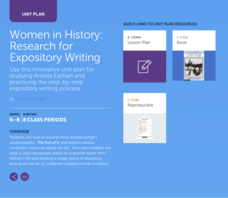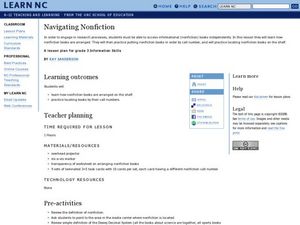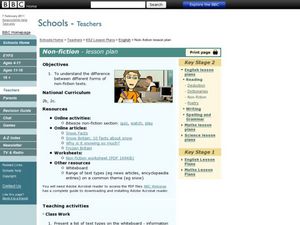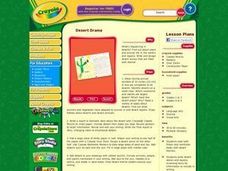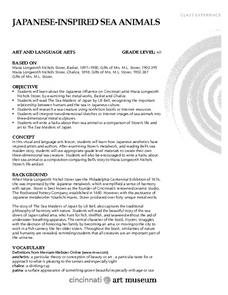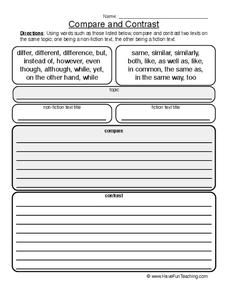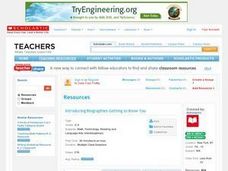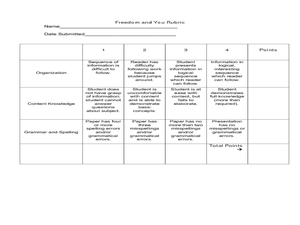Curated OER
Answering a Research Question
Students explore beginning research skills. In this nonfiction comprehension and research lesson, students generate possible research questions to answer when given the book title of Animals of the Sea and Shore by Ann O. Squire....
Curated OER
Rockin' Picture Books
Learners demonstrate their knowledge of the rock cycle by creating picture books.
EngageNY
Close Reading of Bullfrog at Magnolia Circle: Main Ideas about the Bullfrog
As your class reaches the end of the book Bullfrog at Magnolia Circle, the seventh lesson in this literary unit helps third graders transition from reading narrative to expository writing. Scholars develop their note-taking skills...
Curated OER
Introducing Biographies - Getting to Know You
Students explore several different types of biographies to determine their area of interest, choose one notable person they would like to explore, complete online tutorial on biographies, and use written and Internet resources to...
Curated OER
Reading Questions: Alex Haley's "My Furthest Back Person: The African"
Based on Alex Haley's moving essay "My Furthest Back Person: The African," these 11 questions support comprehension and prepare readers for discussion of the text. Use this tool, and the essay, as a nonfiction addition to units on...
Curated OER
Historical Agency in History Book Sets (HBS)
Study historical events by combining the study of historical fiction and non-fiction. Learners read about true past events in historical fiction novels and then research non-fiction accounts of the same events. What are some differences...
Curated OER
Making a Non-Fiction Big Book
Writing a non-fiction big book can help students learn about research techniques, note taking, and other skills.
Curated OER
Women in History: Research for Expository Writing
After reading an excerpt from Amelia Earhart's autobiography, The Fun of It, learners explore various nonfiction resources about her life and write a short newspaper article on a specific event. They then develop a longer piece of...
Curated OER
Fiction vs. Nonfiction
Learners explore fiction and nonfiction writing. They identify the elements of fiction in a short story and identify the criteria necessary in a nonfiction piece. Students distinguish the author's purpose in an expository text,...
PBS
To Kill a Mockingbird Teacher's Guide
If you're planning a unit on To Kill a Mockingbird by Harper Lee, don't pass this resource by! It includes thorough discussion questions and vocabulary from the novel, research opportunities, and writing prompts to extend learning...
Curated OER
Navigating Nonfiction
Third graders explore the arrangement of nonfiction. In this library skills lesson plan, 3rd graders examine Dewey Decimal classification as they collaborate to locate nonfiction materials in the library/media center.
PBS
Arthur’s World Neighborhood: Bibliography for Kids
Support young learners as they expand their cultural awareness with this list of children's literature on countries from around the globe. Including both fictional and non-fictional texts. This resource will help...
Prestwick House
In Cold Blood
In Cold Blood, Truman Capote's groundbreaking work in the world of nonfiction literature, is the focus of a quick review resource. Readers solve a crossword puzzle that offers clues about the book's characters and events.
Curated OER
Non-Fiction Texts
Third graders examine different types of non-fiction texts. In this non fiction lesson, 3rd graders use different types of texts to gather information. Students work in groups to analyze the texts for author's purpose, common...
Curated OER
Insects
It's a fact: kids love bugs! With this lesson, young learners explore reading informational texts and conducting research while learning about their favorite insects. Spark learners' interest by reading a book about one kind of bug and...
Curated OER
Farm Animals
Why are farm animals important to the community? Expand young farmers' knowledge of furry and feathered friends through stories and a video. There are several books recommended; however, you could use any book about farm animals. A video...
Curated OER
Welcome To Your Library
As an overview of the positive things the library has to offer, this would be a helpful presentation. However, it does not provide much information. This presentation could be augmented by adding details about the Dewey Decimal system or...
Curated OER
Digging Up Dinosaurs
In this report writing worksheet, students prepare to write a dinosaur report by selecting and reading a nonfiction book. Students choose one dinosaur and write a report following the specific guidelines on this page.
Curated OER
Desert Drama
Students read both fiction and nonfiction books with desert themes. Then they write desert stories and reports, reviewing texts for information to include in writing. Students also design desert scenes with details and setting elements...
Curated OER
Japanese-Inspired Sea Animals
Learners explore the Japanese influence on Cincinnati artist Maria Longworth Nichols Storer, by examining her metal works, Basket and Chalice. They research a sea creature using nonfiction books or Internet resources. Students write a...
Have Fun Teaching
Compare and Contrast (3)
Sometimes the way a topic is presented in fiction can be very different from how it is in reality. Compare and contrast a topic from both a fiction and nonfiction source with a graphic organizer that prepares kids to write about what...
Curated OER
Introducing Biographies-Getting to Know You
Students study biographies as a nonfiction genre while examining a variety of examples. Next, they access and complete an online tutorial about biographies. They choose one person that interests them to conduct further research using a...
Curated OER
Freedom and You
Students research the American Revolution. For this Revolutionary War lesson, students research facts about the American Revolution, write an expository essay, and peer edit for good content. The paper is suggested to be written after...
Curated OER
Mississippi River
Students study scanning and skimming techniques. In this research skills lesson, students use the research techniques on print literature about the Mississippi River. Students prepare book talks on the literature they read.









